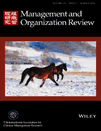 The headline of this post is the title of a fascinating new paper in the Journal of Management suggesting that if the road to publication is paved with good intentions, it may also be paved with bad scientific practice.
The headline of this post is the title of a fascinating new paper in the Journal of Management suggesting that if the road to publication is paved with good intentions, it may also be paved with bad scientific practice.
Ernest Hugh O’Boyle and colleagues tracked 142 management and applied psychology PhD theses to publication, and looked for various questionable research practices — they abbreviate those “QRPs” — such as deleting or adding data after hypothesis tests, selectively adding or deleting variables, and adding or deleting hypotheses themselves.
Their findings?







